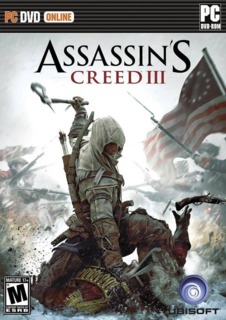Bigger and better, but nonetheless more of the same. Gets repetitive, unless you came for the convoluted storyline.
The story takes the Assassins to the New World, and covers the span of the Seven Years' War and War of American Independence. As with previous games, expect a ton of historical and pesudo-historical content, as well as a romp through a world long past. As usual, the game world is a fantastic construct in and of itself, beautiful to behold and to live in. It makes one wonder how many people worked for how long to build it (and then you're forced to watch the end credits, which are about as long as that. Note there's a little extra after the credits, so go grab something to eat while you wait).
Assassin's Creed 3 does a great job introducing new gameplay elements and adjustments which fans of the series will enjoy. There is a very wide assortment of tools and weapons to use, both in combat and without, giving many options to play with. Combat is simpler to some extent, but more complex in terms of what you can do. Furthermore, hunting mechanics (yes, hunting, as in animals) becomes a primary feature of the game, and is well-developed. The crowning achievement however is naval combat, which is spectacular and fun (and quite difficult at times). Certainly a ton of effort was placed into taking this game one step higher than its predecessors, and that effort was not wasted.
On the other hand, Assassin's Creed 3 is an open-ended game, and as such a player who wishes to investigate the world and to see all there is to see can easily end up spending TONS of time just running around and repeating certain procedures over and over. For the most part this isn't actually worth it, and some of the side-quests are downright embarassing (assassination contracts = find four targets around the city and kill them, reward is a tiny bit of money).
If you want the most out of this game without spending too much time, playing the main story missions, Liberation missions and Homestead missions should be quite enough. For completionists, there is a LOT of extra stuff to be done, and the rewards are usually just cosmetic.
I mentioned "Homestead" missions, and this is quite an important part of the game in my opinion. Minor spoiler: you get to pretty much establish a small community out in the wilderness, and can cultivate it and protect it. This is almost a secondary main storyline, and in my opinion is very well-written. By the time you're done, you'll feel you have actually created something alive and thriving, and it is a very satisfying feeling. Kudos to the developers for this choice.
I do have one personal gripe with this game, which is that stealth is extremely difficult to utilize properly. It's very hard to discern when it is safe to move or to kill a soldier without being detected, leading to many instances where combat will ensue whether you like it or not. It's a shame, but fortunately combat is not so hard that you can't just "plough through" most of the time. Still, this IS a stealth game, so too much combat just feels like you're doing something wrong (and sometimes will deduct points, too...).
If you own a console, I would suggest buying this game for that console rather than the PC. As with most action games today, the PC version is simply a "port" - the same game translated to be used with a mouse and keyboard, and unfortunately Ubisoft still have no idea how to do this. Many menus feel horrible to navigate with this interface, it seems almost like none of the UI designers has ever used a mouse. Also I hear the game is actually MORE expensive for the PC, which is just mindboggling. There are also many glitches of various sorts which may or may not exist in the console versions - though none of them are downright game-breaking bugs.
I give this game a big thumbs up for its immersiveness and massive amount of content, though I would hope that in the future Ubisoft will pay more attention to PC interface design, and will simply give up on repetitive missions and content that takes hours to unlock. They're on the right path, but still have a long way to go with both of these.

